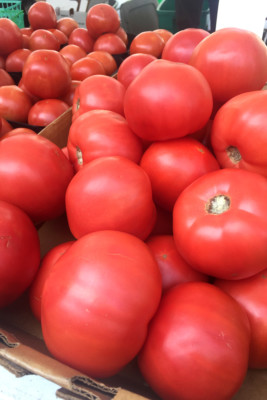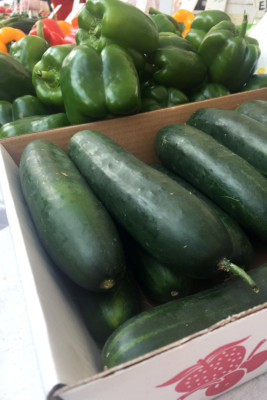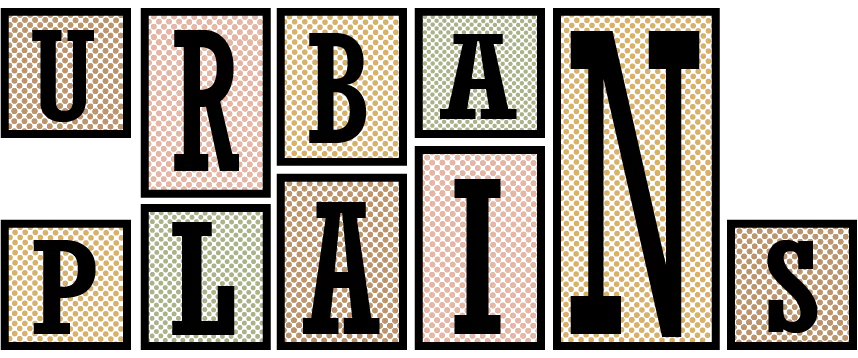 Photos by Amanda Muir
Photos by Amanda Muir
Subscription boxes and hand-delivered meal prep kits are all the rage right now. Subscribers searching for an easy dinner or a surprise meal can sign up for any number of services to have food shipped to them from across the country (or across the world). But before there were subscription boxes, there was community-supported agriculture (CSA).
Community-supported agriculture connects farmers with local kitchens. Instead of stopping at the local farmers market, community supporters buy a share in a CSA farm, like Blue Gate Farm in Chariton, Iowa, or Raccoon Forks Farm, which has two locations in Runnells and Redfield, Iowa. In return, they receive boxes of fresh produce each week during the season, and other fresh foods like eggs if the farm also raises animals.
Jill Beebout, one of the owners of Blue Gate Farm, says the benefits of CSA can be huge for farmers. “When CSA was first established, one of the driving factors was to provide farms with income up front, when so much of our expense is,” she says. “And that’s an amazing benefit, to have money coming in in early spring when we’re spending a lot of money on seeds and supplies. That’s huge for the farm.”
But having money up front can also be a liability later on, Beebout explains. “In a year where the weather is stressful, the crops are stressful, you know, other extenuating circumstances, then the farmers’ anxiety is notably higher because we owe people that food that they’ve already paid for,” she says.
Beebout says they’ve been farming since 2005 and have been a CSA since 2006. CSAs have been around all across the U.S. since 1985. “It was very small. It was 13 members that first year, it was tiny,” she says.
“When they open their box it should feel like Christmas, and not this overwhelming sense of responsibility and dread. So if you’re approaching your CSA with dread, there’s something amiss.” –Jill Beebout
Blue Gate Farm has 50 supporters this year, but Beebout also mentioned that they’ve had more in the past. “Two years ago, two seasons ago, we had a two-year waiting list to get into our CSA, and for the last two seasons since then, we have been unable to fill to capacity,” she says. Part of the decline has been the growing popularity of CSA farms since Blue Gate started. “There’s never one thing,” Beebout says. “But there are many more CSAs than when we first started, so there are lots of options, and there are lots more options for nontraditional grocery store food.”
Beebout says they’ve lost some of their supporters over the years simply because their lives have changed; either they’ve moved out of the area, or their children have grown up and they don’t need as much fresh produce anymore. And she also says that CSA isn’t for everyone, and that people have to be open to trying new things. “You’ve got to think of it as an adventure. We refer to it as our veggie adventure,” she says. “When they open their box it should feel like Christmas, and not this overwhelming sense of responsibility and dread. So if you’re approaching your CSA with dread, there’s something amiss.”
Tastes Like Fresh
Sara Thies, who has been supporting Blue Gate Farm since their second year as a CSA, says that her boxes have inspired her to try different foods and to be more creative in the kitchen. “It forces me to cook with more vegetables. So I get a lot of fresh vegetables in my diet,” she says. “And I think it also to inspires me to be a more original cook, because you try to figure out how many ingredients you can use up in one dish.”
“You’ve got to think of it as an adventure. We refer to it as our veggie adventure.”–Jill Beebout
Thies also says that when the weather doesn’t cooperate, Beebout is still great about providing her supporters with fresh and unique foods. “On years when Jill [Beebout] has had some trouble getting either too much rain or not enough rain she’s had some crop failures, she gets real inventive and we have more foraged vegetables,” Thies says. “So it’s opened my culinary palate up to all kinds of foods like purslane and things that people would consider weeds. She’s encouraged us to think beyond just the farm foods, which has been very nice.”
In addition to trying new foods, Thies also says she enjoys getting produce from CSAs because she knows where the food came from, and that it’s local and fresh. “You know it was picked that day or the day before—you don’t know how long it’s just been sitting on the grocery store shelf,” she says.
No Two CSAs Are Just Alike
Raccoon Forks Farm is also a CSA, but it also offers employment opportunities to adults who have intellectual disabilities or face other obstacles when searching for jobs.
Much like Blue Gate Farm and other CSAs, Raccoon Forks Farm offers community supporters several different options; they can purchase full or half shares for winter and summer veggies, as well as separate egg shares to receive farm-fresh eggs. “It’s a very nice way for people who live locally but maybe can’t do a lot of gardening themselves or maybe they live in an apartment and don’t have access to their own space to get locally grown, chemical-free food,” says Harriett Dickey-Chasins, who manages Raccoon Forks Farm’s marketing.
 No matter what community supporters find in their box, Raccoon Forks Farm tries to help their customers learn more about their food so they can store and cook it properly. “We are always careful to send out information on here’s how you store these vegetables, and here’s some recipes you can make with them, and here’s how to preserve them if you can’t eat them right now,” says Dickey-Chasins. “So we try to really make it easy for people and help them know what to do with their shares.”
No matter what community supporters find in their box, Raccoon Forks Farm tries to help their customers learn more about their food so they can store and cook it properly. “We are always careful to send out information on here’s how you store these vegetables, and here’s some recipes you can make with them, and here’s how to preserve them if you can’t eat them right now,” says Dickey-Chasins. “So we try to really make it easy for people and help them know what to do with their shares.”
Gillian Claycamp, the service coordinator for Raccoon Forks Farm, agrees that education is a big part of running a CSA. “We really want people to come in from the community and feel secure in the knowledge that we will help them with anything that they’re not sure about,” she says.
“It’s a very nice way for people who live locally but maybe can’t do a lot of gardening themselves or maybe they live in an apartment and don’t have access to their own space to get locally grown, chemical-free food.” –Harriett Dickey-Chasins
The farm will also be starting a swap box at each pick-up location this year that allows supporters to share their food with others if they feel they have too much of one veggie and won’t use all of it, or if they receive a type of vegetable in their box that they’re not a fan of. “So if someone gets their box and they like everything in it but they’re just really not crazy about radishes, they could leave their radishes in the swap box for someone who would appreciate them,” says Dickey-Chasins. “But while they’re dropping those in, if they see someone’s kale in the box, and they love kale, they can take that kale with them. So it’s a way that people can customize their shares a little bit when they pick them up that I think our members are going to really enjoy.”
Even though CSA may not fit with everyone’s lifestyle, it can be a great way for consumers to add more fresh produce to their diets and to help support local farmers. Instead of going to the grocery store to grab a tomato off the shelf, CSA lets people drive down the road to their local farm for a tomato that’s farm fresh and oh-so-tasty.

